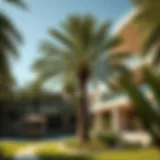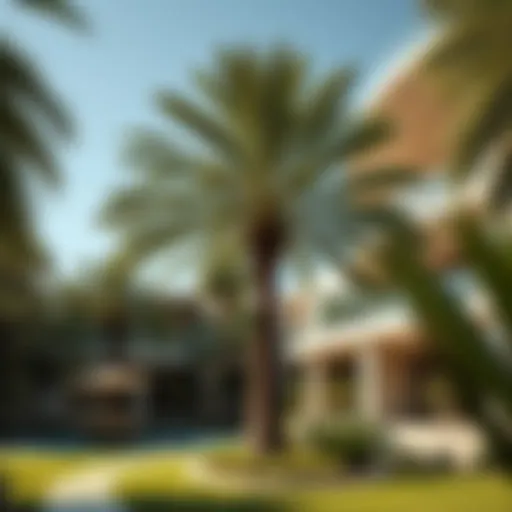Classic Properties in Dubai's Vibrant Real Estate Market
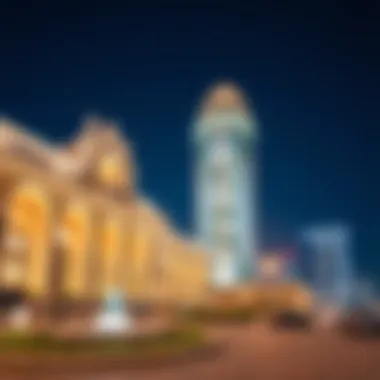

Intro
Dubai's evolution from a humble trading post to a global megacity is a tale of ambition and transformation. Amidst the glass towers and bustling malls stand classic properties that whisper the city's past, each with its own story and significance. These buildings are not mere structures; they embody the rich heritage of a nation while offering an intriguing confluence of historical charm and modern luxury.
Investors, realtors, and buyers alike find themselves drawn to these classic gems, not just for their aesthetic values but for their potential returns. As they navigate the tide of Dubai's vibrant real estate market, understanding the nuances of classic properties becomes critical. This article seeks to cast light on the architectural significance, investment opportunities, and evolving market dynamics that surround these timeless treasures.
By delving into various aspects such as market trends, buyer preferences, and the luxurious property landscape, we provide readers with vital insights. Whether you're eyeing a historic villa in Jumeirah or a traditional home in Bur Dubai, your journey to making informed decisions starts here.
Market Insights
Current Market Trends
In the realm of real estate, knowing what's hot can be the difference between a good deal and a great one. Classic properties in Dubai have seen a resurgence, drawing a variety of buyers from affluent investors to families looking for unique homes. The demand is notably high in well-established areas, particularly those that showcase architectural styles that harken back to Dubai's golden era.
According to a recent report from the Dubai Land Department, vintage properties have led to a substantial rise in prices, signaling a shift in buyer preferences toward spaces that offer both history and character. Top neighborhoods where classic properties thrive include:
- Jumeirah: Renowned for its spacious villas with traditional designs, many of which are situated near the serene beaches.
- Al Fahidi District: Showcasing a medley of restored wind-tower buildings that illustrate Dubai's architectural genesis.
- Sheikh Juma: Where older homes are being embraced for their unique designs and proximity to cultural sites.
Future Projections
Looking ahead, experts predict that the allure of classic properties will only grow stronger. Factors contributing to this forecast include:
- Cultural Tourism: As Dubai aims to enhance its cultural footprint globally, homes that reflect traditional influences will likely benefit from increased visibility.
- Sustainable Development Initiatives: Developers are focusing more on integrating classic designs with modern sustainability, further increasing the value of these properties.
- Expanding Expatriate Market: With the influx of new residents eager to experience Dubai's rich history, buyers are showing increasing interest in properties that offer not just luxury but also a story to tell.
"Investing in classic properties is like buying a piece of history, which grows in value both sentimental and financial."
As the market continues to evolve, the classic property segment will undoubtedly play a pivotal role in shaping Dubai’s future.
Investment Strategies
Best Practices for Buying Luxury Property
When it comes to making a solid investment in classic properties, some strategies can pave the way to success:
- Conduct Thorough Research: Familiarize yourself with the history, architectural features, and market demands of the property type you're interested in.
- Hire a Local Expert: Realty agents with experience in classic properties will be invaluable in navigating the nuances of these deals.
- Focus on Location: Classic homes in prime areas generally appreciate better over time; always consider location over size.
Rental Yield Insights
Investors looking into classic properties should also consider their rental yield potential. The rental market in Dubai has proven resilient, but classic properties often command a premium due to their charm and uniqueness.
For context, properties in sought-after areas are realizing rental yields ranging from 7% to 9%, depending on various factors such as:
- Historical Significance: Homes with a rich history often attract renters looking for a unique experience.
- Proximity to Amenities: Properties that are close to cultural landmarks or business districts naturally draw higher rents.
The classic property market, with its blend of old-world charm and strong investment potential, offers a treasure trove of opportunities for discerning investors.
Understanding Classic Properties
Understanding classic properties is fundamentally about grasping the character and essence of a significant segment within Dubai's real estate market. These properties don’t just offer four walls and a roof; they encapsulate stories, cultures, and the very pulse of history. In a rapidly developing metropolis like Dubai, where modern skyscrapers scrape at the clouds, classic properties stand as stoic reminders of a bygone era, inviting admiration and investment alike.
Definition and Characteristics of Classic Properties
Classic properties usually embody unique architectural styles that might reflect cultural influences from various periods. Properties such as the older villas near Al Fahidi Historical District are prime examples. These structures often incorporate elements that distinguish them from contemporary designs. Key characteristics include:
- Intricate Detailing: Classic properties frequently showcase artisan craftsmanship, venerable woodwork, and detailed stone carvings.
- Spacious Layouts: Many classic homes offer larger floor plans, with high ceilings and expansive rooms that facilitate a more luxurious living experience.
- Historic Materials: The use of traditional building materials like coral stones or vintage tiles is a hallmark of these properties.
Architectural Styles and Historical Influences
Dubai is a melting pot of architectural styles, thanks to its rich history and multicultural populace. Classic properties often reflect styles that came before the skyline featured by glass and steel. Some influential architectural styles include:
- Islamic Architecture: Characterized by intricate geometric designs, mashrabiya (latticework), and expansive courtyards, this style is prominent in many of Dubai's classic buildings.
- Arabesque Elements: Decorative arts have left their mark on classic homes. Embellishments inspired by the natural world—like floral motifs—tell tales of the region's cultural legacy.
- Victorian Influences: You can find echoes of Victorian architecture, especially in some of the preserved villas, which emphasize ornate decorations and complex rooflines.
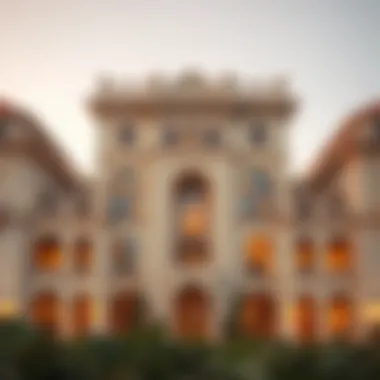

The Role of Classic Properties in Dubai's Landscape
Classic properties contribute significantly to the overall socio-economic fabric of Dubai. They attract a special category of buyers and investors who appreciate heritage and history. These properties often:
- Boost Tourism: Historic sites and classic properties draw tourists, providing a peek into the city’s past, thereby benefiting local economies.
- Enhance Cultural Appeal: They promote cultural identity amid a sea of modern architecture, fostering a sense of place and belonging.
- Offer Investment Opportunities: Investors often see classic properties as stable investments. Over time, their charm tends to appreciate, making them valuable assets in a diverse portfolio.
"In a world increasingly driven by the new, classic properties remind us of the value of history and stability."
In summary, understanding classic properties necessitates an appreciation of their architectural significance, historical context, and cultural impact. This segment of the market not only enriches the real estate landscape but also offers a distinct allure to investors and residents alike, providing opportunities for both financial gain and personal enjoyment.
Market Trends in Classic Property Investments
The exploration of market trends in classic property investments is paramount for those looking to navigate Dubai’s sophisticated real estate landscape. Understanding these trends doesn't merely entail recognizing shifts in property values or sales volume; it also involves delving into buyer behaviors, prevailing architectural tastes, and the overall sentiment towards classic properties. The intricacies of these factors can reveal valuable insights that aid investors, realtors, and developers in crafting informed strategies.
Current Trends in Luxury Real Estate
The luxury real estate market in Dubai has seen an uptick in demand for classic properties, spurred by shifting preferences among affluent buyers. Sleek skyscrapers and modern villas, while still popular, are increasingly sharing the limelight with historical homes that tell a story. Buyers today are seeking authenticity and heritage, leading to a rise in interest for architectural designs that evoke a sense of nostalgia.
A few key trends include:
- Increased Interest in Heritage: Many buyers are drawn towards properties that reflect Dubai's rich history. They are not just looking for a home, but a piece of art that illustrates the city's evolution.
- Sustainability in Luxury: The modern buyer is often concerned with sustainability in high-end living. Classic properties, which traditionally utilize natural materials and craftsmanship, can align well with these values.
- Curated Neighborhoods: Areas that integrate classic properties often provide a curated living experience, blending luxury with cultural richness. Neighborhoods like Jumeirah and Al Fahidi are prime examples where classic and modern intertwine beautifully.
Demand for Classic Properties: Analyzing Buyer Behavior
Understanding the buyer's psyche is crucial when gauging the market demand for classic properties. Many purchases in this segment aren't purely deeded investments; they often stem from emotional connections and lifestyle aspirations. Potential buyers might have various motivations:
- Affluent expatriates often look for classic properties to savor a taste of history and tradition amid the marvel of modernity.
- Local investors may view such properties as vehicles for long-term financial returns while preserving cultural heritage.
- This dual appeal of both investment and emotional ownership helps maintain a steady demand in this niche.
The psychological element is further underscored by factors such as the rapid urbanization of Dubai, allure of exclusivity, and a yearning to own something unique, which classic properties undeniably offer.
Performance Metrics: Price Trends and Valuation
Analyzing price trends in classic property investments provides a clearer picture of their investment potential. Properties in established neighborhoods tend to hold value more effectively than those in newer developments. This is largely because buyers are willing to pay a premium for classic flair, location desirability, and cultural richness.
Factors influencing price trends include:
- Location: Proximity to cultural landmarks, accessibility to key amenities, and neighborhood reputation can vastly influence valuations. Neighborhoods known for their classic properties generally report a healthy appreciation in value.
- Condition and Demand: A well-maintained classic property can fetch considerably higher prices compared to those requiring extensive repairs. Demand often drives competition, particularly during peak seasons.
The luxury segment often experiences fluctuations relating to broader market conditions, but luxury classic properties frequently demonstrate resilience, making them a more stable investment over time.
In essence, the intersection of modern luxury and classic integrity in Dubai’s real estate market reveals deeper layers of value for discerning investors.
Investment Potential of Classic Properties
The significance of investing in classic properties in Dubai's real estate market cannot be overstated. These timeless structures embody aesthetic values and historical narratives, often commanding higher levels of appreciation than modern counterparts. Investors drawn to classic properties find an alluring blend of charm, culture, and potential for profit. Understanding the investment potential thoroughly brings to light not just the immediate benefits, but also the long-term implications that can shape an investor’s portfolio over time.
Long-term Value Appreciation
Investors often consider long-term value appreciation as a primary factor in their investment choices. Classic properties in Dubai, steeped in history, often gain intrinsic value as they age. Unlike modern constructions that can exhibit rapid depreciation due to shifting design trends, classic properties usually experience a gradual increase in worth, particularly in well-maintained areas.
Some key considerations regarding long-term value appreciation include:
- Building Heritage: Properties recognized for their architectural significance tend to capture a premium in the market. Investors generally see this as a solid foundation for scalability.
- Location Dependability: Classic properties located in historically rich districts are likely to appreciate due to their inherent demand, further fueled by cultural tourism.
- Cultural Importance: As Dubai continues to promote its heritage and culture through various initiatives, classic properties are often viewed as vital components of the local identity.
"Investing in classic properties isn't merely about the structures; it's about the history and culture they embody. Such factors can translate into substantial market advantages."
Risks and Challenges in Investment
With every rose comes its thorns, and classic properties aren't exempt from potential pitfalls. Investors must navigate through various risks that could impact their investment outcomes. A closer examination reveals the following challenges:
- High Maintenance Costs: Older properties often require renovations or repairs that can strain finances, especially if the property carries historical significance needing specialized preservation methods.
- Market Volatility: Classic properties can be subject to the whims of market trends, exposing investors to periods of stagnation or decline.
- Regulatory Hurdles: Navigating preservation regulations can be daunting. Investors might find themselves entangled in the rules governing restorations and modifications, which can complicate any long-term planning.
Understanding these risks is critical for potential investors. A balanced approach, incorporating both opportunity and caution, lays the groundwork for success in this unique segment of the market.
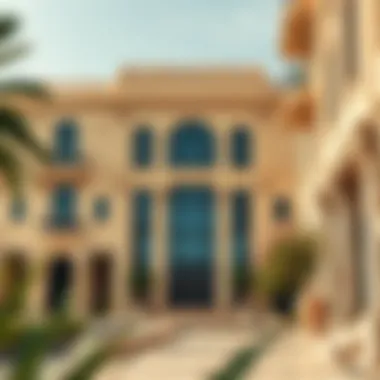

Comparative Analysis with Modern Properties
When placed side-by-side, a stark contrast emerges between classic and modern properties. Each type holds distinct advantages, but the context of Dubai’s market shapes how investors perceive their worth.
- Aesthetic Appeal: Classic properties often boast unique architectures that serve as statements of elegance, whereas modern properties tend to focus on minimalism and functionality. This aesthetic charm can lure niche buyers, thus driving up demand and prices for well-preserved classic units.
- Investment Stability: While modern properties emerge with current technologies and building practices, they can exhibit overwhelming supply, leading to a fluctuating price point; classic properties often retain steadier demand within specific demographics.
- Potential Returns: Some studies suggest that high-end classic properties may yield better returns on investment compared to modern alternatives, partly due to their unique character.
For investors, a nuanced understanding of these aspects aids in crafting strategies that capitalize on the colors of both classic and modern offerings.
In summary, the investment potential of classic properties within Dubai’s real estate landscape is substantial. With their promise of long-term appreciation, while encapsulating unique challenges, these properties beckon investors seeking to harmonize both cultural heritage and financial growth.
Neighborhoods Known for Classic Properties
Understanding the neighborhoods that house classic properties is crucial for anyone looking to invest in Dubai's real estate market. Each area tells a unique story, with its own blend of history, culture, and architectural beauty. Recognizing these neighborhoods can help investors and homebuyers make informed choices that align with their goals—be it living in a historic gem, finding a good investment opportunity, or restoring a piece of culture.
Historical Districts and Their Significance
Dubai boasts several historical districts, each steeped in rich heritage. One of the most notable is Al Fahidi Historical Neighborhood, which showcases a traditional Arab lifestyle. The winding alleyways and wind-tower architecture transport you back in time, reflecting Dubai's cultural roots. Houses there were built using coral stone and gypsum, making them sturdy and stylish during warmer months.
Another significant area is Deira, known for its bustling souks and vibrant atmosphere. This historical district not only offers classic properties but also acts as a hub for commerce, attracting both locals and tourists. Such neighborhoods often hold great investment potential, as they invite interest from those who appreciate the cultural essence of Dubai. The street markets, local eateries, and traditional art galleries here are a constant reminder of the city’s evolution.
"Investing in these historical districts gives you more than just property; it's a stake in a rich narrative that can appreciate significantly over time."
Emerging Areas with Classic Property Appeal
While historical districts are well-known, other emerging neighborhoods also offer unique classic property options. Places like Jumeirah and Satwa, for instance, are seeing a surge in demand for classic villas and bungalows that resonate with a personalized touch.
These areas are increasingly becoming chic hubs for cultural enthusiasts. The charm of older homes juxtaposed against modern developments creates a melting pot of styles. Buyers today are keen to find residences that stand apart, and locations that carry a sense of heritage are favored. Investors should consider these emerging neighborhoods, as their growth shows promising signs. New development projects might be sprouting, but the classic homes here tell a story of continuity amidst change.
Local Amenities and Community Lifestyle
When looking at classic properties, potential buyers should also consider local amenities. Older neighborhoods often provide accessible services that newer areas may lack. Parks, local markets, and schools within close proximity contribute to a community lifestyle that many cherish. This sense of community becomes more pronounced in neighborhoods with classic homes.
For instance, in neighborhoods like Al Quoz or the older parts of Jumeirah, local amenities often include quaint cafes, art studios, and community centers that foster social interaction. Engaging with the community can help new investors understand the local landscape better.
Investors, realtors, and homebuyers alike should take note of these neighborhoods where classic properties thrive, ensuring their investment is not just in a property, but in a way of life.
By focusing on both the richness of history and the potential for future growth, one can uncover incredible opportunities in these neighborhoods.
Legal Aspects and Regulations
Understanding the legal landscape when it comes to classic properties in Dubai is essential for anyone looking to navigate this unique segment of the real estate market. Given the historical significance and intricate guidelines surrounding classic properties, ensuring compliance with local laws is a priority for both investors and residents. This segment will unpack vital elements like ownership laws, maintenance regulations, and tax implications, all of which play a crucial role in ensuring a smooth investment experience.
Understanding Ownership Laws for Classic Properties
Ownership laws for classic properties can often be a bit of a minefield due to their historical significance. The laws in the UAE tend to favor specific ownership structures. For example, only citizens and particular foreign entities can own property in designated areas. It's crucial for potential buyers to differentiate between freehold and leasehold properties in Dubai.
- Freehold Properties: Allow full ownership by non-UAE nationals in specific areas.
- Leasehold Properties: Typically, provide extensive rights for a number of years, but don’t offer outright ownership.
Moreover, foreign investors must be aware of the relevant permitting and registration processes. Engaging with local legal experts can shed light on the maze of legal conditions and ensure that all necessary paperwork is in order. Understanding these laws not only protects the buyer's investment but also preserves the integrity of these historically rich structures.
Maintenance and Preservation Regulations
Maintaining classic properties invites both challenges and rewards. Regulations often require that any restoration must adhere to specific guidelines to preserve the character of the building. These regulations are vital for the conservation of Dubai's architectural legacy, but they can also impose limitations on what can be changed or renovated.
- Importance of Preservation: Preserving the aesthetic and structural integrity of classic properties is paramount. This often means that any modification must not compromise the original materials or design.
- Professional Involvement: It’s typically necessary to engage specialized professionals, such as conservation architects, to maintain compliance with local laws.
"Investing in a classic property isn't just about purchase price. It's about understanding its legacy and the legal stipulations that come along for the ride."
Prospective owners should familiarize themselves with regulations outlined by the Dubai Culture and Arts Authority, which offers guidelines on the preservation of heritage sites. Following these can enhance the property’s value and appeal, while also ensuring that its historical significance is respected.
Tax Implications of Investing in Classic Properties
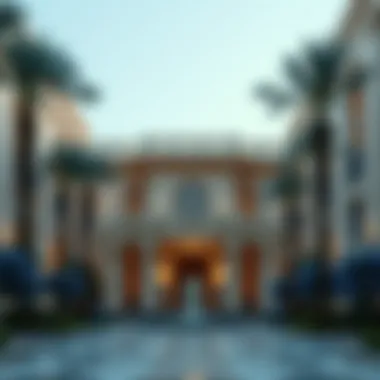

Investors should also be well-informed about the tax considerations when it comes to owning classic properties in Dubai. The tax structure in the UAE is known for being quite investor-friendly, yet there are still fees and regulations that need to be considered.
- No Property Tax: Currently, there is no general property tax in Dubai, which is a significant draw for investors. However, it's essential to consider the registration fees, which can run around 4% of the purchase price.
- Other Costs: Investors should also be prepared for potential service charges, which can be significant for classic properties due to their maintenance needs.
Potential buyers must also stay updated on any changes to these regulations, as they can shift based on economic conditions and government policies. Engaging local tax professionals can help in navigating the tax landscape effectively.
In summary, understanding the legal framework governing classic properties is crucial for investors and homeowners alike. Familiarity with ownership laws, preservation guidelines, and tax implications will not just safeguard one’s investment but also promote the rich cultural narrative woven into these timeless structures.
Managing Classic Properties
Managing classic properties in Dubai's real estate market is no small feat. These properties, with their cultural significance and architectural elegance, demand a level of care and understanding that goes beyond typical property management. Overseeing them involves recognizing not just their structural needs but also their historical value and the expectations of an discerning clientele eager to invest in such treasures.
Property Management Best Practices
Efficient management of classic properties hinges on specific best practices to preserve and enhance their unique charm. Here are key elements to consider:
- Regular Maintenance: Classic properties require consistent upkeep to prevent issues associated with aging structures. Things like plumbing, electrical systems, and roofing should be checked routinely.
- Expertise and Training: It's essential to have a team that understands both modern standards and historical preservation techniques. That blend of knowledge ensures any restoration work respects the building’s heritage.[^1]
- Communication with Stakeholders: Regularly updating owners and potential buyers keeps them informed and engaged. Transparency about management practices builds trust and helps facilitate successful transactions.
- Leveraging Technology: Utilizing property management software helps streamline operations. Keeping digital records of maintenance, repairs, and tenant communications fosters organization, which is vital for such complex properties.
Restoration vs. Renovation: What Investors Should Know
When delving into classic properties, investors often grapple with whether to restore or renovate. Understanding these approaches is crucial for making informed choices.
- Restoration: This approach aims to return the property to its original state, preserving historical elements. For example, maintaining original wood flooring or vintage facade details keeps the property’s character intact.
- Renovation: In contrast, renovation might involve modernizing facilities while compromising some structural aspects. This could appeal to buyers interested in contemporary conveniences.
Investors should weigh the historical significance against market demand. An approach focusing too heavily on modernization may alienate buyers seeking the charm and authenticity of classic structures.
Insurance Considerations for Classic Properties
Insuring a classic property comes with its own set of complexities. Traditional insurance policies may not adequately cover the unique risks these properties face. Here’s what to keep in mind:
- Specialist Insurers: Seek out insurers who specialize in historic properties. They often understand the nuances that come with such investments, accommodating replacement costs that align with the property's true value.
- Adequate Valuation: It’s critical to have an accurate assessed value, one that reflects the replacement of original materials and craftsmanship. Using a certified appraiser with experience in historic buildings can prevent under-insurance.
- Policy Clauses: Scrutinize policy texts for clauses specific to restoration efforts. Some policies may provide limited compensation for damages tied directly to the age of the property.
- Liability Risks: Liability insurance should encompass unique risks inherent to classic properties, like historical artifacts or architectural features that could lead to injuries or mishaps.
Understanding these layers of managing classic properties in Dubai enhances not only their value but also their story. Such efforts honor the past while creating a prosperous future for investors and the community alike.
By applying these guidelines, property managers and investors can secure the longevity and relevance of classic properties in a rapidly evolving market, ensuring they remain cherished assets for years to come.
[^1]: For more on property management best practices, see National Association of Realtors.
See the information from Wikipedia for more details on property management.
Future Outlook for Classic Properties in Dubai
The future of classic properties in Dubai presents a compelling narrative infused with opportunity and heritage. As the city's landscape continues to evolve, classic properties emerge as potential cornerstones for investments that intertwine history with modern luxury. Investors and buyers alike are increasingly turning to these properties, not just for their aesthetic values but for the unique experiences and stories they embody. Understanding the future outlook requires a deep dive into the social, economic, and cultural factors that frame this captivating segment of Dubai's real estate market.
Predicted Trends in Luxury Real Estate
With the luxury real estate market showing robust resilience, classic properties are predicted to experience unique trends as they align with buyer priorities. Market analysts suggest a growing appreciation for properties that tell a story, a trend deeply rooted in the cultural tapestry of Dubai. More buyers are drawn to homes that reflect a sense of tradition and heritage, leading to an increased demand for classic architectural styles.
- Sustainability: Developers are expected to incorporate eco-friendly upgrades in classic buildings, balancing modern efficiency with historical charm.
- Technology Integration: Smart home features are projected to be integrated within classic properties, enhancing their appeal without diminishing original aesthetics.
- Shift in Buyer Demographics: Younger investors are becoming increasingly attracted to the character and uniqueness of classic properties, differentiating them from the uniformity of contemporary builds.
"The beauty of classic properties lies not solely in their design, but in their ability to adapt and offer modern comforts while preserving their identity."
These predicted trends indicate a strong, evolving market for classic properties, providing both stability and growth potential for investors.
Potential Impact of Global Economic Factors
Global economic factors play a significant role in shaping the landscape of Dubai's real estate, especially in the realm of classic properties. Shifts in global economies influence buyer confidence, investment flows, and overall market demand.
- Economic Recovery Post-Pandemic: As the world recovers from recent economic downturns, increased spending power among wealthy individuals can drive demand for luxury real estate, including classic homes.
- Interest Rates and Financing: Fluctuations in interest rates can affect buyer behavior. Favorable rates often encourage investment, particularly in classic properties that are viewed as long-term investments.
- Foreign Investment Trends: The allure of Dubai as an investment destination means that international buyers may seek classic properties, especially as travel restrictions ease.
Understanding how these global currents flow into Dubai can provide real estate professionals with the foresight necessary for navigating the market effectively.
The Role of Cultural Heritage in Real Estate Development
Cultural heritage is at the heart of Dubai's appeal and plays an essential role in the future of classic properties. As urban development marches onward, the preservation of cultural identity becomes crucial for maintaining the charm and distinctiveness that classic properties offer.
- Heritage Sites Protection: Encounters with local regulations aimed at preserving historic architecture can lead to more interest in classic properties from both local and international buyers.
- Cultural Tourism: There's a growing connection between cultural heritage and tourism. As visitors flock to experience the rich narratives of Dubai's past, investors may find value in properties that reflect this history.
- Community Engagement: Future developments may prioritize community engagement, fostering a sense of belonging among residents of classic neighborhoods.
As Dubai grapples with the trade-offs between modernization and preservation, the continued significance of cultural heritage will keep classic properties in the spotlight, ensuring that they remain a sought-after asset for discerning investors.






